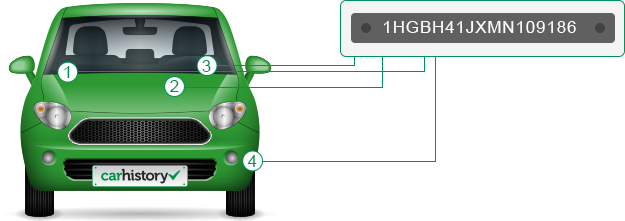
The vehicle identification number (VIN) is composed of 17 characters (digits and capital letters) that act as a unique identifier for the vehicle. A VIN displays the car's unique features, specifications and manufacturer.
The VIN can be found in a couple of places including on the car's registration label (1), on the compliance plate in the engine bay (2) or on the passenger side windshield (3), or on one of the door posts (where the door latches when it is closed) (4). See the image below:
If a change of vehicle has been on the cards for a while, when the time finally comes to make your choice, it can be easy to get caught up in the buying process. You'll spot a model online or across the car yard, and before you know it, you're visualising yourself pulling out in your new ride, tossing your hair in the wind and marvelling at how sweet life is.
But as we all know, when you're making an investment like a vehicle, it's important not to judge a book by its cover, or in this case, a car by its bonnet. You can get ahead of the game by getting a CarHistory report online, which will reveal to you all sorts of juicy details about a car's past including any financial encumbrance.
The Personal Property Securities Register (PPSR) is the result of a government initiative to create a national online database where consumers can query whether a car is tied up in any interest or encumbrance.
In layman's terms, encumbrance of the financial kind refers to whether there is debt tied up in your car - probably through money that is owned on a loan related to the car.
You'll get a PPSR certificate bundled as part of your CarHistory report, but you can also order PPSR certificate on its own. Either way, you can save yourself from making an uninformed decision that could cause you a lot of heartache in the future.
With a PPSR certificate, you can see whether or not money is owed on your car, and the name and address of the interest holder as well as the date that the interest was initially recorded with the PPSR.
It's important to check a used car's financial status before jumping into a sale - by taking the time to check with the PPSR, you can avoid potentially purchasing a vehicle that could end up being repossessed.
When you do a PPSR check, your certificate will come back with one of three options: No security interest, a single registration or multiple encumbrance registrations. It is best to avoid purchasing a vehicle with any registrations associated with it.
"If you buy a second-hand vehicle that is under finance and the finance is not paid out, the interest holder may seek to repossess the vehicle from you," explains the South Australian government.1
It's also a good idea to hold onto a copy of the car's PPSR certificate from the day you buy it as a form of proof that there was no financial encumbrance when the vehicle came into your possession. You can see what a PPSR certificate looks like by downloading a sample here.
1Government of South Australia, Checking the vehicle's encumbrance, stolen or written-off status. Accessed May 29, 2015.